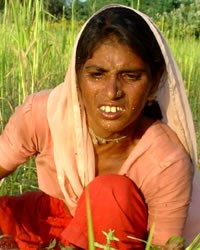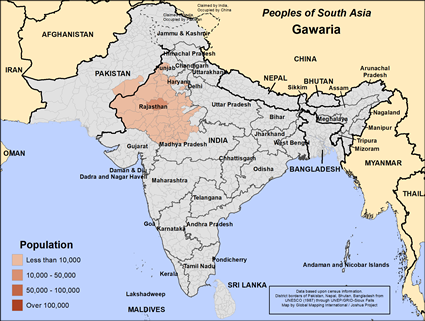Gawaria in India

Photo Source:
Copyrighted © 2026
Isudas All rights reserved. Used with permission |

Map Source:
People Group data: Omid. Map geography: UNESCO / GMI. Map Design: Joshua Project.
|
| People Name: | Gawaria |
| Country: | India |
| 10/40 Window: | Yes |
| Population: | 89,000 |
| World Population: | 89,000 |
| Primary Language: | Hindi |
| Primary Religion: | Hinduism |
| Christian Adherents: | 0.00 % |
| Evangelicals: | 0.00 % |
| Scripture: | Complete Bible |
| Ministry Resources: | Yes |
| Jesus Film: | Yes |
| Audio Recordings: | Yes |
| People Cluster: | South Asia Dalit - other |
| Affinity Bloc: | South Asian Peoples |
| Progress Level: |
|
Introduction / History
The Gawaria were traditionally a Hindu nomadic people who raised sheep and goats. The primary language of the Gawaria is Hindi. They also speak the local languages where they live. Most live in Gujarat and Rajasthan.
What Are Their Lives Like?
The Gawaria were shepherds, traveling traders and carriers. They became traders after their land was no longer able to sustain agriculture or grazing. They once used herds of bullocks and oxen to carry their goods for trade. However, with the advancement in the transportation industry, they have turned to other professions. Some make household articles from cane or wild grass and weave mats. Others work in the building trades especially in masonry. Their literacy level is very low so their job options are limited.
The Gawaria marry within their group but outside of their clan. The bride's family pay a dowry at the time of the wedding. The couple often goes to live with the groom's family. The bride and groom circle a sacred fire seven times during the wedding. Brahmin priests officiate at weddings.
They allow for divorce and remarriage, but only with the consent of the community caste council. A Brahmin priest performs a naming ceremony for a newborn on the seventh or ninth day after birth. Inheritance is equally divided among sons and the eldest takes over the guidance of the family after the father dies.
What Are Their Beliefs?
The Gawaria practice Hinduism, the ancient religion of India. They worship and serve the gods of the Hindu pantheon. Hindus believe that by performing rituals and good works that they will attain moksha or freedom from the endless cycle of birth, death and rebirth. The Gawaria visit Hindu temples and offer prayers, food, flowers, and incense to their gods in hopes of gaining protection and benefits. They do not have a personal or familial relationship with their god as Christians do. There are many forms of Hinduism, each with its own deities and beliefs. The main yearly holidays of the Gawaria people are Holi, the festival of colors and the start of spring, Diwali, the festival of lights, Navratri, the celebration of autumn and Rama Navami, Rama's birthday. The caste system divides Hindus into four main categories. The lowest communities are outside of the caste system. The Gawaria fit in the working caste.
What Are Their Needs?
The Gawaria people need the chance to know Jesus and experience his abundant life.
Prayer Points
Pray for loving workers to take the gospel message to the Gawaria community.
Pray the Lord will prepare the hearts of the Gawaria to understand and to believe the gospel.
Pray for the Lord to bless the Gawaria people with adequate education and medical facilities.
Pray for the Lord to bless the Gawaria people so abundantly that they will see he is the only one worthy of praise and worship.